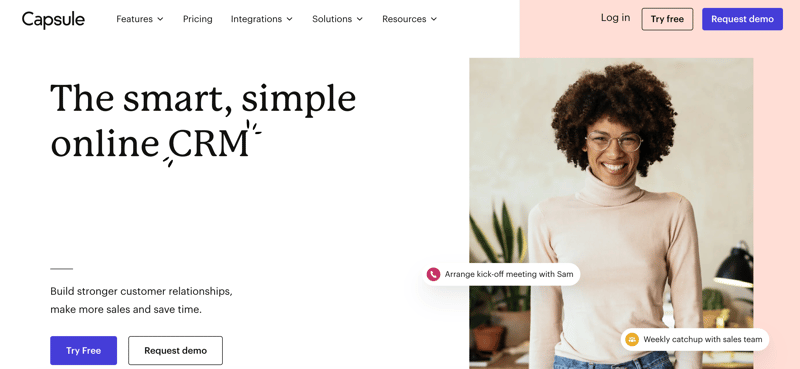
5 Reasons Why You Need a Travel Agency CRM (Pro Tips Included)
 Updated on
Updated on
 By Bradley Kovacs
By Bradley Kovacs
Bradley Kovacs
Bradley has been passionate about technology since childhood, starting with Microsoft Flight Simulator at age six. In college, he automated his data e...
learn more
Bradley Kovacs
Bradley has been passionate about technology since childhood, starting with Microsoft Flight Simulator at age six. In college, he automated his data e...
Table of Contents
Table of Contents
Running a travel agency is exciting, but it can also be chaotic. Between managing leads, tracking bookings, and keeping clients happy, things can quickly spiral out of control. That's where a travel agency Customer Relationship Management system (CRM ) comes in.
Whether you're a solo travel agent or managing a large team, the right CRM for travel agencies streamlines operations, enhances customer experience, and ultimately boosts revenue. But with so many travel CRM solutions out there, how do you know if you really need one?
Here's the truth: If you want to stay ahead in the competitive travel industry, a CRM for travel agents isn't just helpful—it's essential.
Let's look at five compelling reasons why you should invest in a travel agency CRM software today. (Bonus: We'll throw in some pro tips along the way!)
Introduction to Travel Agency CRM
What is a CRM for travel agents?
A CRM is a customer relationship management system. It's software that links sales, marketing, customer services, and IT on one platform so you have full oversight of your business and all your data in one place.
It also allows you to automate tasks within and between each of these areas. Did you know that about a third of all sales tasks can be automated with CRM software?
Here are some examples of tasks that a CRM can help you automate.
|
Team |
Automations available with travel agency CRM |
|
Sales |
|
|
Marketing |
|
|
Customer services |
|
Sounds pretty good, right?
But there are a lot of things that would be “pretty good” for your business to have. What makes a travel agency CRM a necessity?
Best CRM for Travel Agents
*Note: All pricing details accurate as of March 2025*
Is it a little cheeky of us to put ourselves first? Maybe. But we really believe that Ringy is the best CRM for travel agencies.

We offer powerful, cloud-based sales and marketing automation features at a fraction of the cost of other leading CRM systems.
With the click of a button, you can:
- Launch a drip marketing campaign
- Import leads
- Send SMS or emails to customers
- Take or forward calls
… and much more. All in an easy-to-use interface that'll have your staff up to speed in no time.
Our pricing is great value at just $119 per month after a one-month free trial, with add-ons for a Power Dialler calling usage usually totaling around $70 per month.
This is especially great because you won't be surprised by rising prices as you move up a tiered pricing system, like with some travel CRMs – just take a look at the top of that table we showed you earlier to see what we mean.
Capsule

Capsule is an example of a purpose-built travel CRM system, one of many that Capsule has built for different sectors.
The key selling point of this travel CRM is its range of integrations with well-known apps, including:
- QuickBooks
- Mailchimp
- Sage
- Outlook
- Gmail
Capsule also has analytics features available to give you in-depth, usable insights into your customers, such as their favorite destinations and even their preferred hotels.
It is priced per user, per month, starting at $18 when billed annually, for the Starter package.
Zoho CRM

Zoho CRM is a big player in the CRM market.
It's highly customizable, with a vast suite of integrations available with many major apps as well as more niche add-ons.
Zoho's pricing doesn't scale as eye-watering as some CRM solutions, and it has a free version available for up to three users.
|
Membership |
Standard |
Professional |
Enterprise |
Ultimate |
|
Cost per user, per month (billed annually) |
$12 |
$20 |
$35 |
$45 |
However, as we've mentioned above, customizable CRM solutions like this can have a high start-up cost due to the development work involved in getting them set up.
You'll need to work with a Zoho development partner to fit the software to your business needs, and SalesNexus reckons that CRM development projects like this usually cost around $17,000 total.
Depending on your development solution, you may also be sacrificing the customer service we outlined as being so important earlier.
5 Reasons Why You Need a CRM for Travel Agency
A travel agency CRM isn't just another tool—it's your secret weapon for staying organized, delivering exceptional service, and growing your business. Here's how the right CRM for travel agents can transform your workflow:
1. Automating Customer Interactions and Follow-Ups
Keeping up with leads, follow-ups, and client communications can be overwhelming. A CRM for travel agencies automates emails, reminders, and follow-ups, ensuring no potential booking slips through the cracks.
You can also set up automated responses for inquiries, send personalized trip updates, and schedule follow-ups—all without lifting a finger.
2. Managing Bookings, Inquiries, and Itineraries in One Place
Juggling spreadsheets, emails, and handwritten notes? A CRM for the travel industry centralizes everything—bookings, client details, itineraries, and supplier information—so you can manage trips seamlessly. Whether you're handling group tours or custom vacations, having all details in one place makes life easier.
Pro Tip: Choose a travel agency CRM software with real-time updates so you can quickly adjust itineraries and notify clients instantly.
3. Improving Customer Retention With Personalized Travel Recommendations
Loyal customers are the backbone of any successful travel agency. With a CRM for travel agents, you can track customer preferences, past bookings, and travel habits to offer personalized trip suggestions. Whether it's a honeymoon, adventure trip, or luxury getaway, personal touches keep clients coming back.
4. Enhancing Team Collaboration and Workflow Efficiency
A growing travel business means multiple agents handling inquiries, bookings, and customer service. A CRM for travel companies ensures seamless collaboration by allowing team members to access shared client data, notes, and trip details in real time. No more double bookings or miscommunication!
Pro Tip: Opt for a CRM system for travel agency with mobile access so your team can stay connected, even on the go.
5. Tracking Sales Performance and Revenue Insights
Want to know which destinations are trending? Or which clients book the most luxury trips? A CRM for travel agencies provides valuable analytics on sales, customer behavior, and revenue trends. With real-time insights, you can refine your marketing strategies and maximize profits.
Now that you know why you need one, let's explore how to choose the best CRM for travel agencies in the next section!
Key Considerations When Choosing a CRM for Travel Agencies
To get the most out of your investment, you need a system that fits your business needs and enhances your workflow. Here's what to consider when selecting the best CRM for travel agencies:
Essential Features: Itinerary Management, Automated Reminders, and Lead Tracking
You have two main options when you're choosing a CRM for travel agencies:
|
Travel CRM option |
Pros |
Cons |
|
A ready-built CRM system designed for the travel industry |
|
|
|
Customizing a general-purpose CRM |
|
|
Ultimately, the option you choose will come down to your business processes, and which one offers you the features you need to streamline them.
To start with, you should be looking for all the standard CRM features. These include:
- Cloud storage, so that you can access your CRM from anywhere
- Contact management
- Email marketing automation
- Lead distribution
- Calendar automation
However, you'll also want industry-specific tools and integrations that are advantageous for travel agents. These include:
- Itinerary Management: Easily create, modify, and share detailed travel itineraries, ensuring clients have all trip details in one place.
- Automated Reminders: Send timely notifications for payment deadlines, flight updates, and visa requirements to keep clients informed and stress-free.
- Lead Tracking: Capture, categorize, and nurture potential customers efficiently, ensuring no travel inquiry goes unanswered.
With these specialized features, a CRM for travel agencies becomes an indispensable tool for managing your business effortlessly.
Integration With Booking Platforms, Payment Gateways, and Marketing Tools
A great CRM for travel agents should seamlessly connect with your existing tools—whether it's airline and hotel booking platforms, payment processors, or marketing automation software.
This ensures a smooth workflow, from lead generation to final payment, without manual data entry. So, look for a CRM software for travel industry that integrates with popular platforms like Amadeus, Sabre, Stripe, and Mailchimp to streamline operations.
User-Friendliness and Customization Options
Your team shouldn't need a manual the size of a guidebook to use your travel CRM. The best CRM for travel agencies is intuitive, easy to navigate, and customizable to your agency's specific processes. Whether you need custom fields for trip preferences or automated workflows for follow-ups, flexibility is key.
Cost vs. Value: Finding the Right CRM for Your Agency's Need
A CRM for travel industry is an investment, but that doesn't mean you have to break the bank. Consider the pricing structure—some CRMs charge per user, while others offer scalable plans.
Focus on value: Does it improve efficiency, boost sales, and enhance customer satisfaction?
If you're just starting out, explore free CRM software for travel agents before committing to a paid plan. Many premium CRMs offer free trials so you can test features before making a decision.
The right CRM for travel companies should simplify your workflow, enhance customer experiences, and ultimately help your business grow. Now, let's explore some of the best CRM travel solutions available!
Free CRM Software for Travel Agents – Yay or Nay?
There are free and low-cost options out there if you're looking for a travel CRM, but you'll usually be getting a limited version of the software. You know what that means, right?
Yep. Limited results.
Limitations of Free Travel CRMs and When They Might Work
Free CRM travel solutions can help small agencies or solo travel agents get started with basic features like contact management and simple follow-ups. However, they often come with limitations:
- Limited features: Many free travel CRM solutions lack automation, integrations, and reporting tools.
- User restrictions: Some free plans cap the number of users, making it impractical for growing agencies.
- Storage constraints: Limited data storage means you might outgrow the system quickly.
- Lack of support: Free versions typically offer minimal customer service, which can be a problem when you need help.
When it works: If you're a solo travel agent managing a small client base, a free CRM for travel industry could be a good starting point. But for serious scaling, you'll likely need more robust features.
Advantages of Investing in a Paid CRM Solution
A paid CRM for travel agencies provides advanced tools designed to optimize efficiency and customer experience. Here's why it's worth considering:
- Automated workflows: Save time with automated emails, follow-ups, and reminders.
- Seamless integrations: Connect with booking platforms, payment gateways, and marketing tools.
- Scalability: Add more users, customize features, and expand as your agency grows.
- Advanced analytics: Gain valuable insights into customer behavior and sales trends.
- Dedicated support: Get access to professional help whenever you need it.
If you want to scale your travel agency, look for a CRM for travel agents that offers tiered pricing so you can start small and upgrade as needed.
ROI Comparison: How a Paid CRM Can Boost Sales and Efficiency
Investing in a CRM for travel companies isn't just an expense—it's a growth strategy. Here's how a paid CRM delivers better ROI compared to a free version:
|
Feature |
Free CRM |
Paid CRM |
|
Contact Management |
Basic |
Advanced, with segmentation |
|
Automated Follow-ups |
No |
Yes |
|
Booking & Payment Integration |
Limited |
Full Integration |
|
Sales Analytics |
Basic or None |
Detailed Reports & Insights |
|
Customization |
Minimal |
Highly Customizable |
While a free CRM software for travel agents might work for beginners, a paid CRM for travel industry helps agencies streamline operations, improve customer relationships, and boost revenue.
Pro Tips for Maximizing Your Travel CRM Efficiency
Investing in a travel agency CRM is just the first step—using it effectively is what truly drives results. Here's how to get the most out of your CRM for travel agents and maximize efficiency.
Automating Lead Nurturing and Follow-Ups
A CRM for travel agencies automates lead nurturing by sending timely follow-ups, trip reminders, and special offers. You can set up workflows to engage potential clients until they're ready to book.
Using CRM Analytics to Optimize Marketing Campaigns
With a CRM for travel industry, you get valuable insights into customer preferences, booking trends, and campaign performance. Use these analytics to refine your marketing strategy—whether it's promoting popular destinations or sending exclusive deals to high-value clients.
Personalizing Customer Experiences for Higher Retention
Clients appreciate personalized service, and a CRM for travel companies helps you deliver it. Store traveler preferences, past itineraries, and special requests to offer tailor-made recommendations. Sending birthday discounts or suggesting similar destinations based on past trips strengthens customer loyalty.
So, use your travel agent CRM software to segment customers by travel interests (luxury, adventure, family vacations) and send personalized offers.
Training Your Team for Seamless CRM Adoption
Even the best CRM for travel agencies won't be effective if your team doesn't know how to use it. Provide hands-on training and encourage team members to explore automation features, client tracking, and reporting tools. A well-trained team means fewer errors, faster bookings, and better customer service.
For effective training, choose a CRM software for travel agency with an intuitive interface and offer ongoing training sessions to ensure full adoption.
You Need to Consider a Travel CRM
Let's summarize the problem you've had with your systems up til now:
- You've been storing data in different places
- You've been losing track of key information
- You don't have oversight of your sales process
This has three major knock-on effects:
- You're working too hard
- You're not getting enough done
- Your customers aren't getting a personalized experience
With a travel agency CRM like Ringy, you can eliminate these issues through sales automation.
Our software will take the repetitive tasks off your hands, empowering you to deliver the personalized experience your customers know you for.
Let our software take care of the boring stuff. Book a demo with us today.

Skyrocket your sales with the CRM that does it all.
Calling? Check. SMS? Check. Automation and AI? Check. Effortlessly keep in touch with your customers and boost your revenue without limits.

Take your sales to new heights with Ringy.
Sales in a slump? Ringy gives you the tools and flexibility you need to capture leads, engage with them, and turn them into customers.
Subscribe to Our Blog
Enter your email to get the latest updates sent straight to your inbox!
Categories
Related Articles




































































































